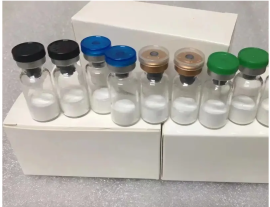-
Categories
-
Pharmaceutical Intermediates
-
Active Pharmaceutical Ingredients
-
Food Additives
- Industrial Coatings
- Agrochemicals
- Dyes and Pigments
- Surfactant
- Flavors and Fragrances
- Chemical Reagents
- Catalyst and Auxiliary
- Natural Products
- Inorganic Chemistry
-
Organic Chemistry
-
Biochemical Engineering
- Analytical Chemistry
- Cosmetic Ingredient
-
Pharmaceutical Intermediates
Promotion
ECHEMI Mall
Wholesale
Weekly Price
Exhibition
News
-
Trade Service
Yimaitong compiled and sorted, please do not reprint
without permission.
Introduction: Elderly diabetics are at high risk of atrial fibrillation, can hypoglycemic drugs prevent it? The latest research results show that sodium-glucose cotransporter-2 inhibitors (SGLT-2i) may be able to do this!
Recently, the first clinical practice investigation on the risk of atrial fibrillation (AF) of the hypoglycemic drug SGLT-2i in the treatment of elderly patients with type 2 diabetes mellitus (T2D) published in JAMA Network Open found that in elderly T2D patients, compared with dipeptidyl peptidase 4 inhibitors (DPP-4i), the risk of AF after using SGLT-2i was significantly reduced, which is of important clinical guiding significance
.
Prevention of AF in elderly T2D patients is of great significance
T2D is a risk factor for AF, and the higher
the risk with age.
Compared with T2D alone, the risk of heart failure and all-cause mortality increased by a factor of 3.
8 compared with T2D alone
.
Among patients over the age of 65, 27% develop atrial fibrillation
within 10 years.
To make matters worse, treatment of AF will greatly increase the patient's disease risk and treatment costs
.
In view of the above reasons, how to prevent AF in time is particularly important
.
The effect of SGLT-2i in preventing AF is worth looking forward to
At present, SGLT-2i, DPP-4i and glucagon-like peptide-1 receptor agonists (GLP-1RA) in T2D therapy are new drugs, and the latest domestic and foreign guidelines also recommend that specific choices
should be made according to patient comorbidities (such as history of cardiovascular disease).
Previous studies have reported that SGLT-2i has many benefits
for cardiovascular and renal function in patients with T2D.
However, in clinical trials, the results of SGLT-2i as a primary prevention of AF were inconsistent, and in order to verify its preventive effect and compare the preventive effect of cardiorenal benefit drugs recommended by guidelines, the researchers designed a trial
comparing the preventive effect of hypoglycemic agents on AF in elderly T2D patients.
According to established inclusion criteria, the study included more than 200,000 elderly patients with T2D (mean age 72 years, 53.
4% female).
After the propensity scores matched, 149736 names (74,868 pairs) were given SGLT-2i or DPP-4i, and 160,950 (80,475 pairs) were given SGLT-2i or GLP-1RA.
The primary outcome of the study was the occurrence of an AF event
.
The incidence of AF was lower in the SGLT-2i group
The incidence of AF was lower in the SGLT-2i group compared with the DPP-4i group (HR 0.
82, 95% CI 0.
76 to 0.
89; 16.
8 vs 20.
5 per 1000 person-years).
The incidence of AF was lower in the SGLT-2i group compared with the GLP-1RA agonist group (HR 0.
9, 95% CI 0.
83 to 0.
98; 17 versus 1000 person-years vs 18.
7 per 1000 person-years).
Table 1 Key findings
Analysis of subgroups found the same results as above, with no effect on SGLT-2i and AF onset
by age, sex, history of heart failure, or history of atherosclerotic cardiovascular disease.
Figure 1 Subgroup analysis results
summary
These results confirm that SGLT-2i reduces the risk of AF in older T2D patients compared with DPP-4i or GLP-1RA, and this is the first clinical practice investigation
study on the risk of AF in elderly T2D patients (mean age 72 years) initiating SGLT-2i therapy.
Previous studies of the U.
S.
Food and Drug Administration's adverse event reporting system have similarly supported the preventive effect
of SGLT-2i on AF.
Although the mechanism of SGLT-2i reducing the risk of AF has yet to be studied, the results of this study still have important clinical guiding significance, and given the potential benefits of timely initiation of SGLT-2i therapy in elderly T2D patients, more consideration
will be given to balancing the risks and potential benefits when choosing antidiabetic drugs in the clinic.
References: Zhuo M, D'Andrea E, Paik JM, et al.
Association of Sodium-Glucose Cotransporter-2 Inhibitors With Incident Atrial Fibrillation in Older Adults With Type 2 Diabetes.
JAMA Netw Open.
2022; 5(10):e2235995.
Published 2022 Oct 3.
doi:10.
1001/jamanetworkopen.
2022.
35995







